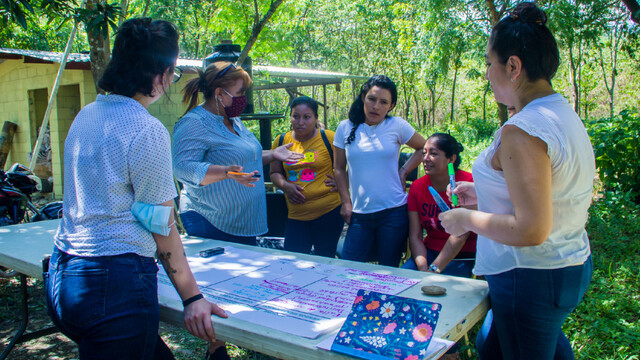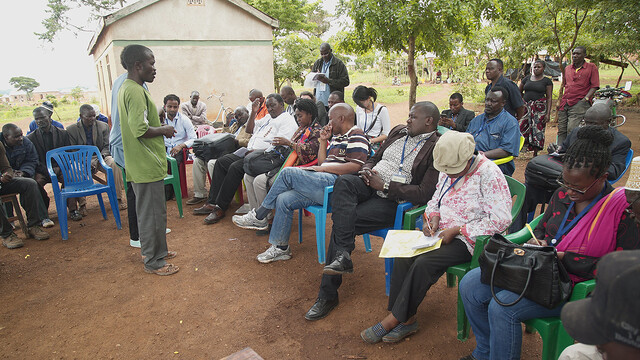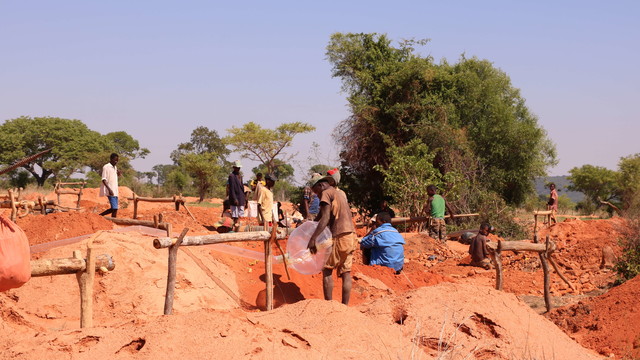Addressing illegal artisanal and small-scale gold mining in Colombia
IIED partnered with DAI to deliver the Mining Horizon programme, which supported USAID Colombia in their partnership with the Colombian government to address illegal artisanal and small-scale gold mining (ASGM) and its related impacts.

Consultation with miners in Caqueta, Amazon, Colombia (Photo: Gabriela Flores Zavala/IIED)
Illegal artisanal and small-scale gold mining (ASGM) has significant negative environmental and social impacts, including contributing to climate change through deforestation and causing air and water contamination through mercury use and land degradation. It also links to other illicit activities and creates opportunities for corruption.
USAID's work in Colombia is the cornerstone of the United States government’s agreement with the government of Colombia in its fight against illegal ASGM. USAID also aims to help the Colombian government meet its commitments under the Minamata Convention on Mercury.
One way to address illegal ASGM is through formalising the sector and encouraging more responsible and transparent mineral extraction and trade.
Through mining formalisation clinics, learning platforms, facilitated dialogues and government-ASM sector interaction, this project aimed to help create the conditions to:
- Improve biodiversity conservation
- Reduce deforestation and environmental contamination
- Support the creation of licit economies
- Strengthen gender equality and social inclusion, and
- Improve rural livelihoods while contributing to peace and security in Colombia.
What did IIED do?
DAI and IIED worked on the Mining Horizon programme – a technical assistance programme designed to support USAID Colombia in addressing illegal ASM.
Convening dialogues
A well-run and transparent multi-stakeholder process with sustainable development objectives at its core is key to build the necessary mutual understanding, improved relationships and collaboration that will make USAID Colombia’s agenda come to fruition, and remain viable into the future.
Building on our dialogue methodology, we brought together the key stakeholders in the ASM sector in Colombia in a series of dialogues, locally and nationally.
We convened a year-long process to engage of miners, women’s groups, government officials and environmental organisations, among others, to set the agenda on two key issues for ASM in Colombia: commerce and trade, and environmental sustainability.
Our approach focused on:
- Creating consensus on a new agenda for change: we engaged stakeholders to unpick complex agendas and identify solutions that built on participants' knowledge, lived experiences and reflections, and provided a space for stakeholders to identify and agree on the main issues that need to be addressed.
- Bringing unheard voices to the debate: we prioritised the voices of miners (especially women and young people), local communities and local civil society groups through miners’ only workshops and meetings, and
- Driving leadership, enthusiasm and confidence: the dialogues were designed to build engagement, and lay the foundation for a ‘network of learners’ from across the sector, who can be a partner of USAID Colombia in any future work on artisanal and small-scale mining.
Supporting a research and learning agenda
An evidence base is essential for any process of dialogue and social transformation. The stakeholder engagement component of any research and learning agenda is fundamental, and there is a need to identify research and learning needs.
Our dialogues:
- Connected Mining Horizon researchers with unheard and less-heard voices. We supported DAI’s integrated natural resource management research team to reach local groups and those with direct experience of the realities of the ASM sector, and helped develop an evidence base that documented local realities
- Recognised and valued the efforts that many Colombian actors had made in recent years to foster evidence and dialogue in the ASM sector. We connected the Mining Horizon research team with existing research and dialogue initiatives, so their work could build on what had already been achieved
- Assessed narratives and communication about the ASM sector: misinformation about the ASM sector abounds, and this can get in the way of building greater support for the sector and the collaboration needed for positive change
While negative practices exist aplenty, we supported the research team to build a more balanced view of the sector to highlight its potential and encourage action towards sustainable development outcomes.
- Worked with stakeholders before the dialogues to build momentum towards the dialogue events, allaying participants’ concerns and working with them to move towards solutions with shared responsibility and leadership, and
- Built understanding of ASM gold along the supply chain. Supply chain actors that source from ASM often have limited understanding of the reality of ASM production. We brought supply chain actors’ perceptions into the dialogue process and communicated information from the dialogue to these actors by sharing communication materials.
Additional resources
Long read: The path towards responsible gold. Encounter of ASM miners in the Amazon Jimmy Carrillo, Jhonny Salazar (2020)
Participation as policy: time to formalise artisanal and small-scale mining in Colombia, Cristina Echavarría, Frances Reynolds (2015), IIED briefing
What is legal? Formalising artisanal and small-scale mining in Colombia, Cristina Echavarría (2014), IIED research report




